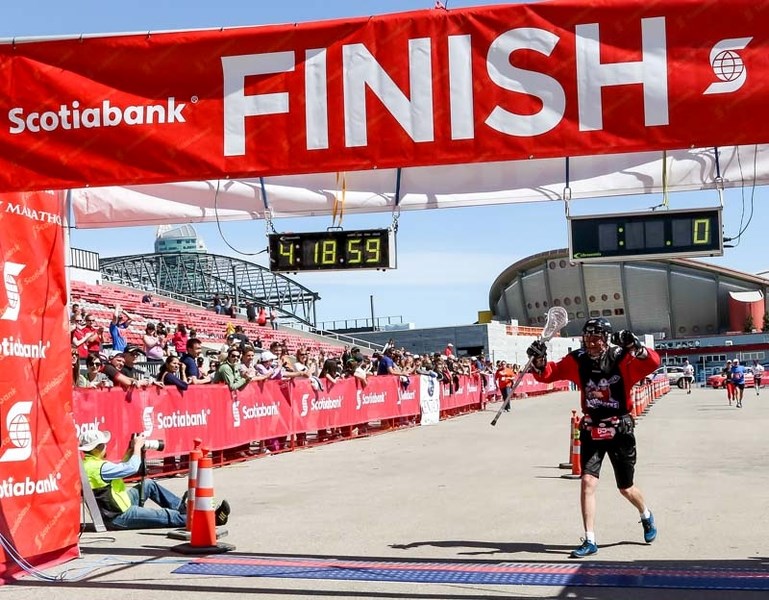We’ve all heard the expression, “We all make mistakes” and it’s true. There isn’t an adult on Earth who, sometime during their life, hasn’t made some. There are others who’ve made quite a few. Even when a mistake can seem so glaring and awful, it’s the way you handle that mistake and what you learn from it that can turn something negative into a positive.
During my Quests for Kids initiative, when I was tackling my 10 endurance quests in the hope of raising $ 1 million, for the charity Right To Play, I confess to making a few mistakes. One I remember in particular.
I decided I would attempt to set a Guinness World Record for the fastest marathon run in full lacrosse gear. At 6.45 a.m. on May 26, 2013, I lined up with approximately 13,000 runners for the start of the 49th Scotiabank Calgary Marathon. Despite this being a new record attempt, the administrators at Guinness had set me a sub four-hour target and this was certainly not going to be a walk in the park.
However, for the month prior, I had been training in full kit. Having previously run nearly 300 marathons, I was feeling confident. I had a plan and I felt all I needed to do was stick to it. I would run to an aid station then take a drink of my water/nutrition mix. A key piece of technology that I had with me was my Helmet 4iiii’s Sportiiii. This little gizmo, attached to my helmet, would give me an audio heart rate and pace at two-minute intervals. To achieve the record, I would have to maintain a pace of five minutes and 30 seconds per kilometre and keep my heart rate below 166 beats per minutes.
Things started off well and the kilometres ticked by. My first problem occurred around 28 km. The sun was getting hotter and hotter and my heart rate hit 165. I was starting to feel some cramping in my legs, so I increased my electrolyte intake. I was still on pace but the heat was beginning to take its toll. By kilometre 34 things were starting to go sideways. My heart rate hit 175 and I was getting light headed. The next four kilometres were a blur. I kept my head up and shoulders back and tried to stay up with the runner in front of me. My head was cooking and my buddies were pouring water through the vents of my helmet.
At kilometre 38 everything fell apart. My legs became rubber and started to spasm. My heart rate spiked at 190 and I finally dropped off a sub four-hour pace. I jogged the next three km in a daze. The final one km I walked. With 300 metres to go, I could hear the crowd cheering in the stadium. I turned into the final 150-metre stretch and with the cheers of the crowd started up a shuffle/run. I crossed the line and collapsed. Medics were there and fellow runner Ally helped me to the medical tent. They laid me down, wrapped me in a silver blanket and fed me apple juice. My final time was four hours 18 minutes and 58 seconds. Not a Guinness World Record.
The mistake I made was not taking into consideration how the weather would play such an important role. I had failed to factor in the effect heat would have on me running that distance, dressed as I was and how I would deal with it.
Lesson learned. But that was something very personal to me.
When you make a mistake in business, it’s a whole different matter. Unless you are self-employed, you can almost guarantee that a mistake you make will have a knock-on effect. In his article How To Handle Mistakes So They Don't Harm Your Career, published in Forbes magazine, Victor Lipman offers some simple, constructive steps that can make mistakes less problematic. Here are some of his comments:
Admit what you did was wrong - Evasion will get you nowhere. Most of the time it only frustrates your management.
Take full responsibility for the error - OK, so you did something wrong. Don't try to come up with fanciful excuses for it. Take ownership and responsibility.
Explain what you learned from it and why you won't do it again - It's OK to make mistakes, but it's not OK to keep making the same one over and over.
Most of all, mistakes can be a chance to show the kind of employee and person, you are. A mistake can actually be a positive opportunity to demonstrate character - to show you're a person who is honest, forthright and can be trusted to tell the truth in a difficult situation.
Mistakes are part of life and most of them can be rectified, but whether they can or not, it’s the way you handle them that defines your character and professionalism.
Just remember, everyone makes them.
© 2017 Martin Parnell
www.martinparnell.com




